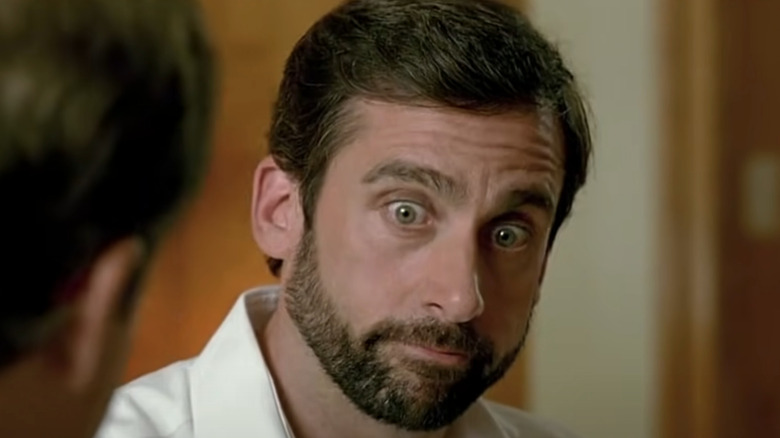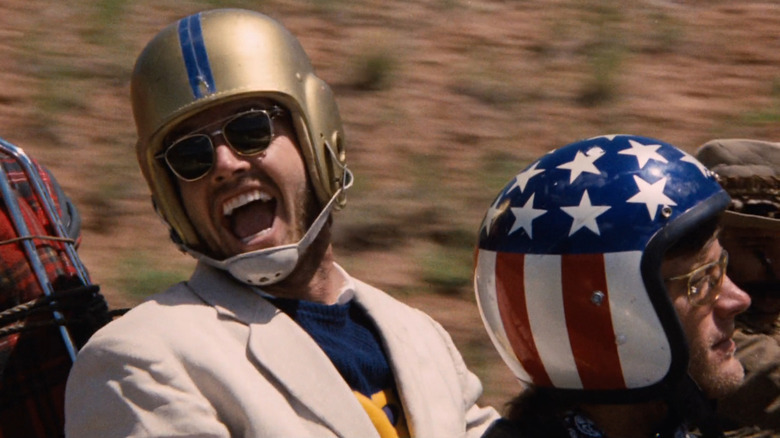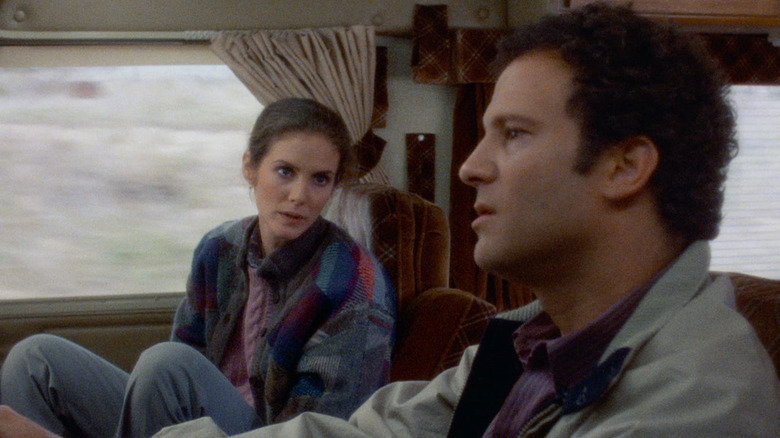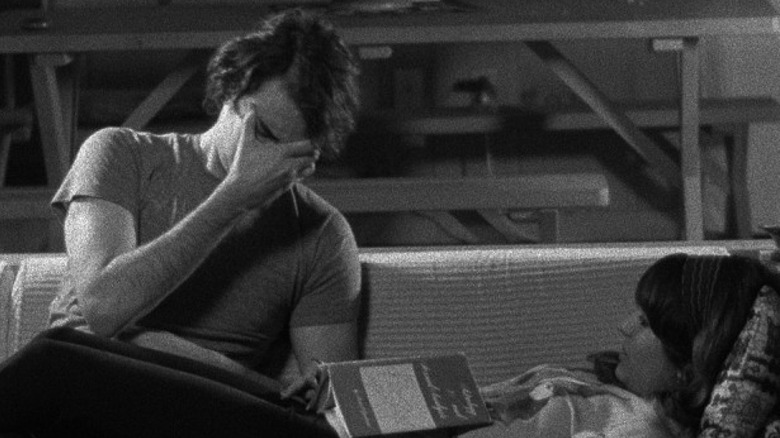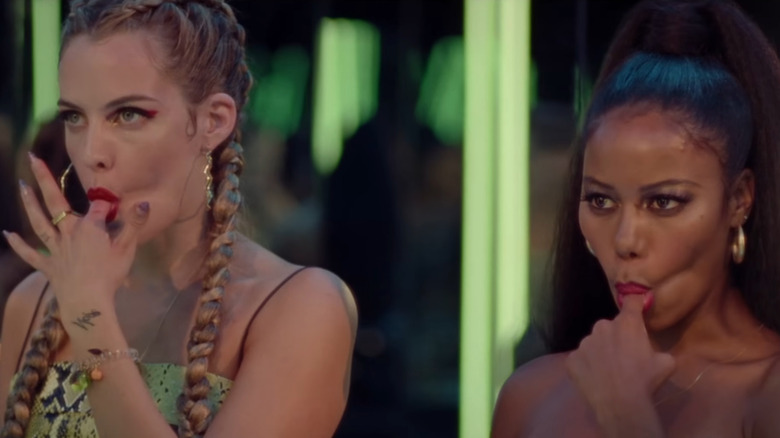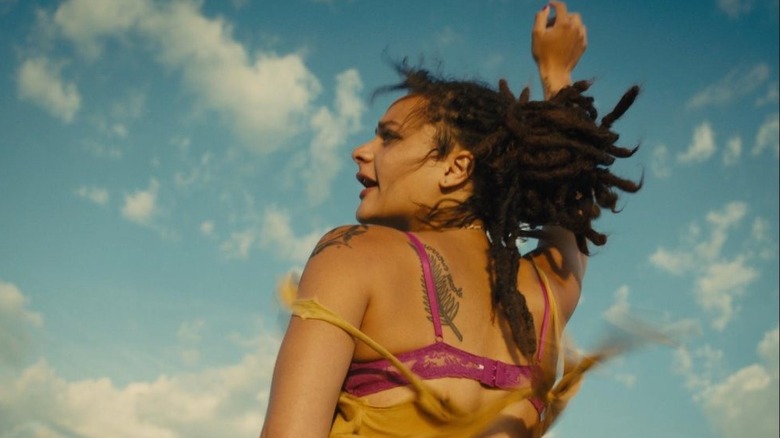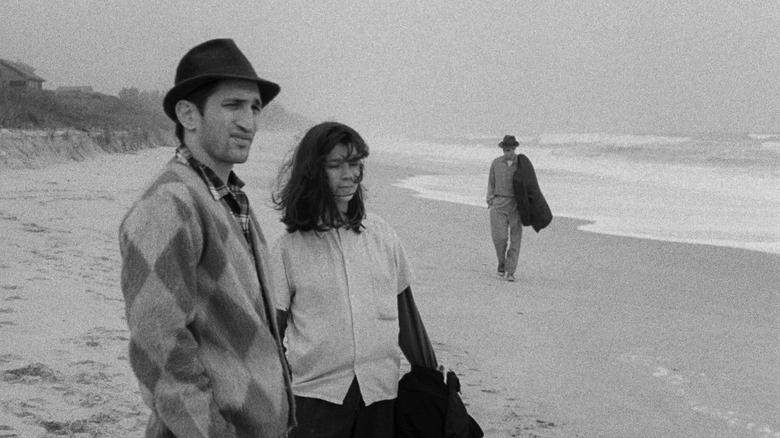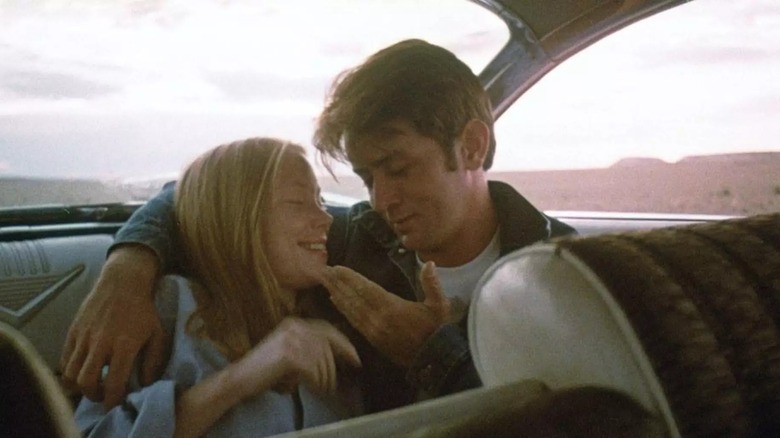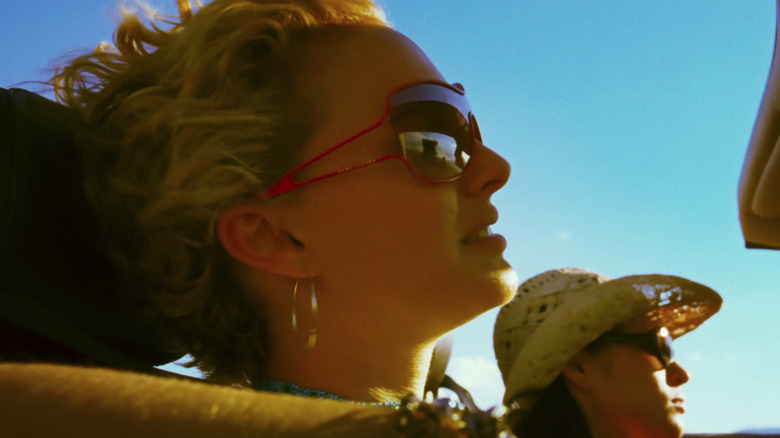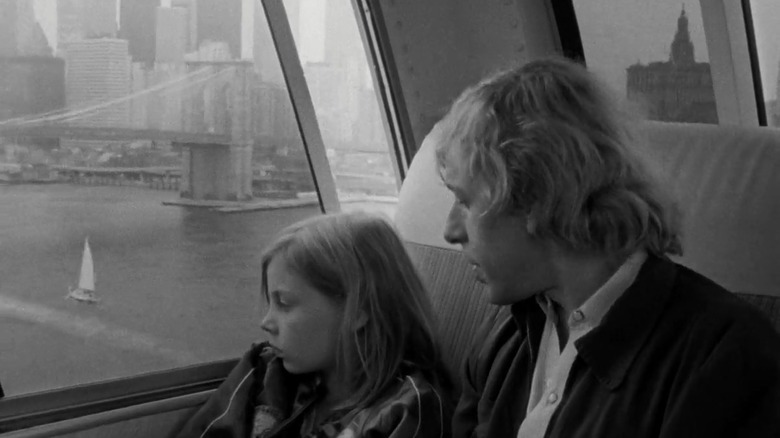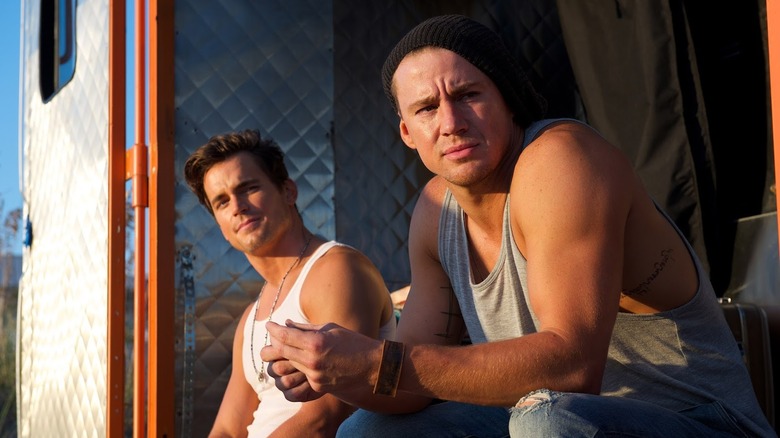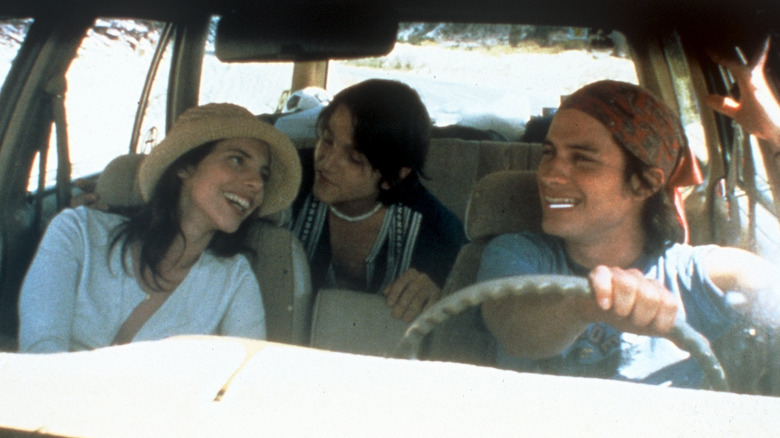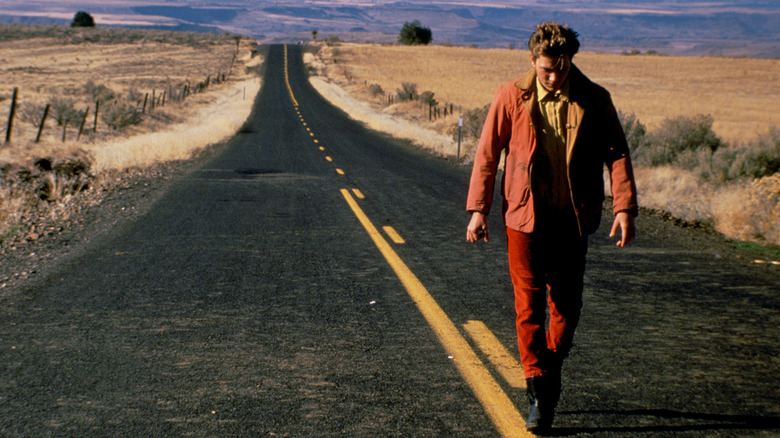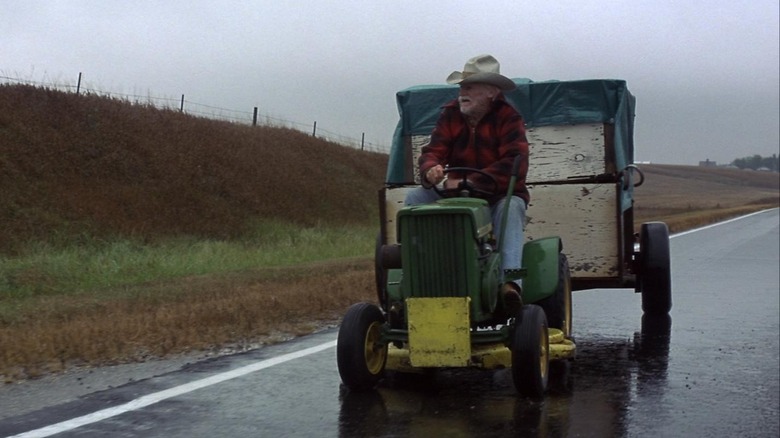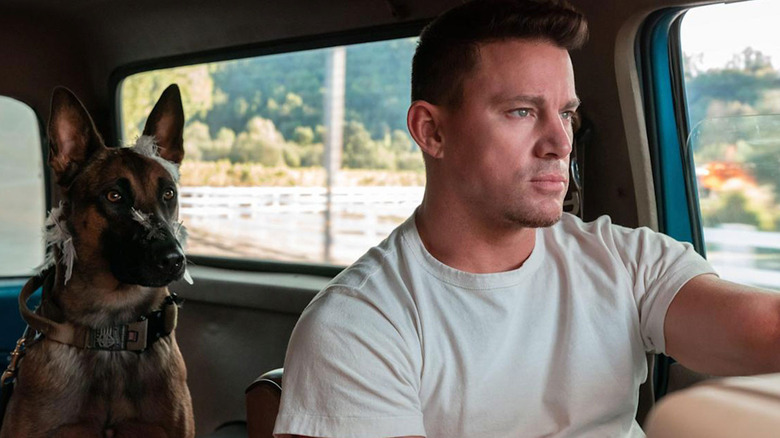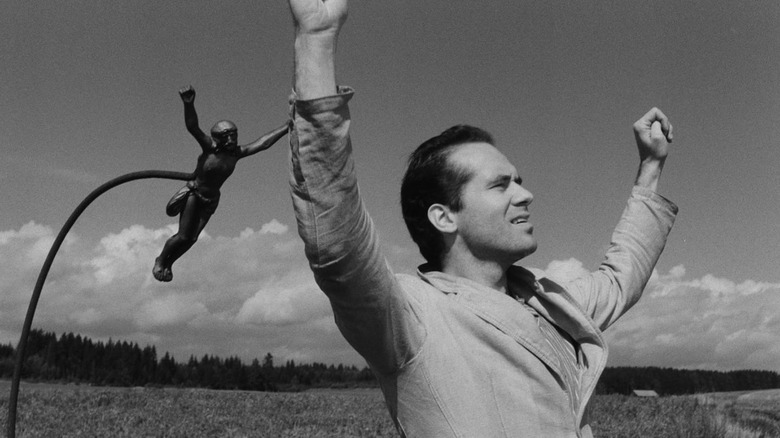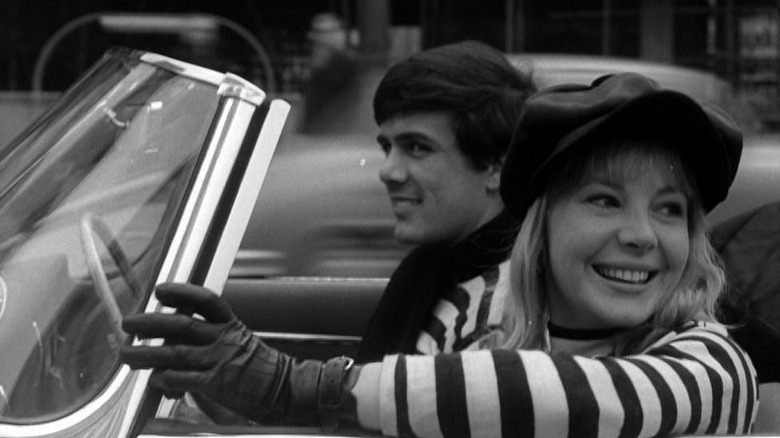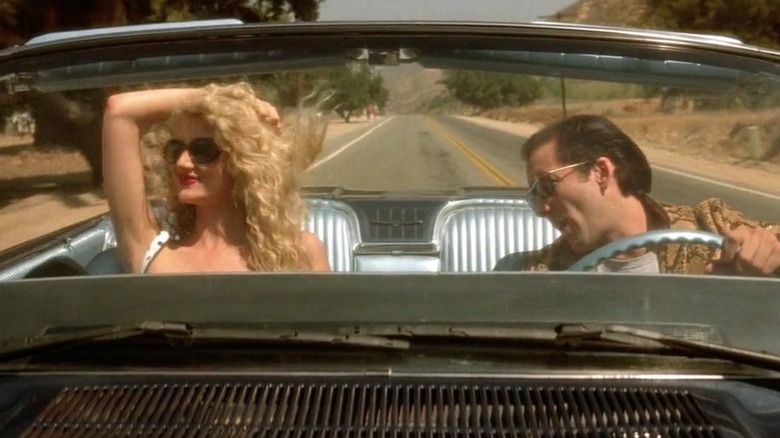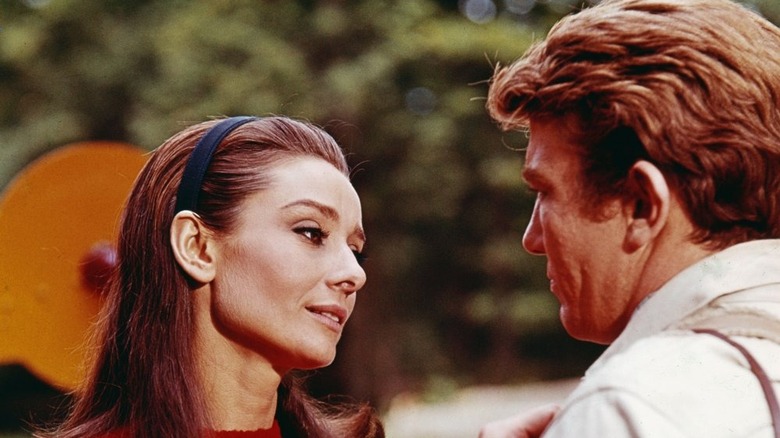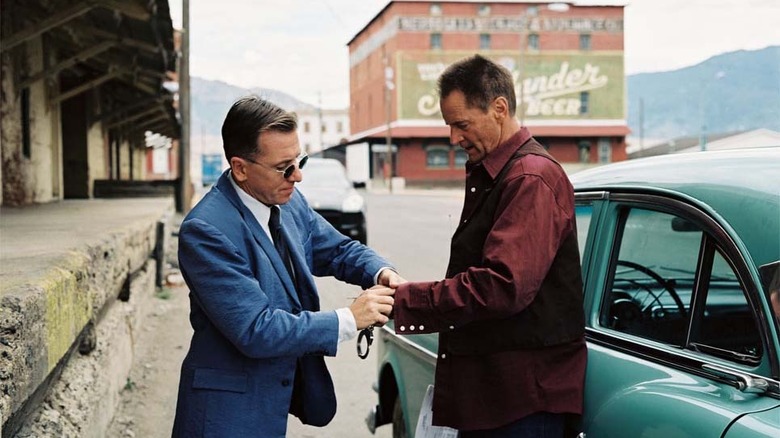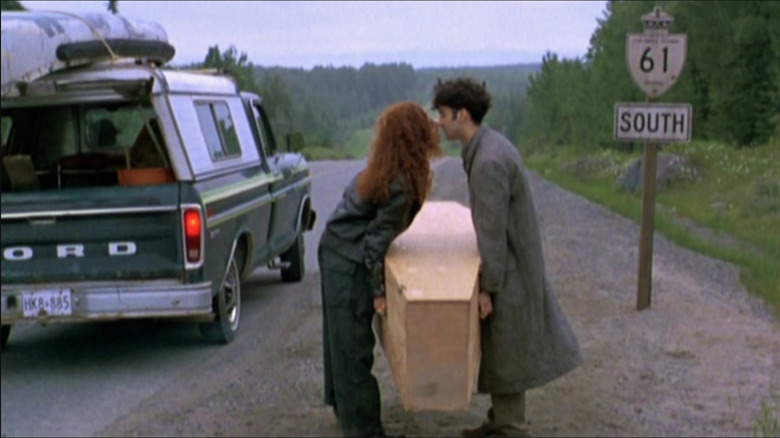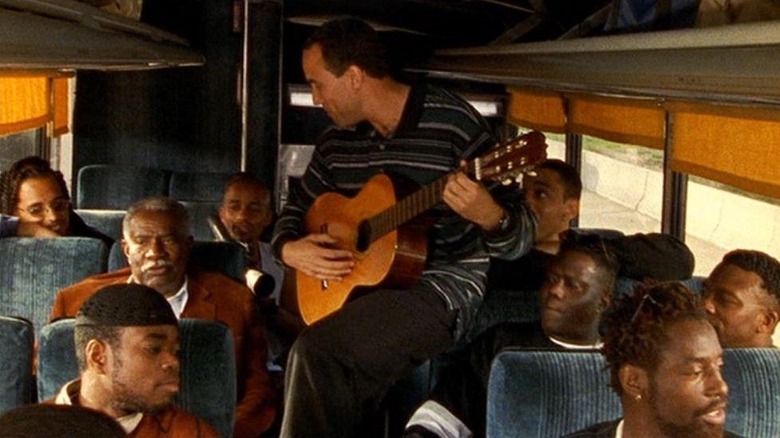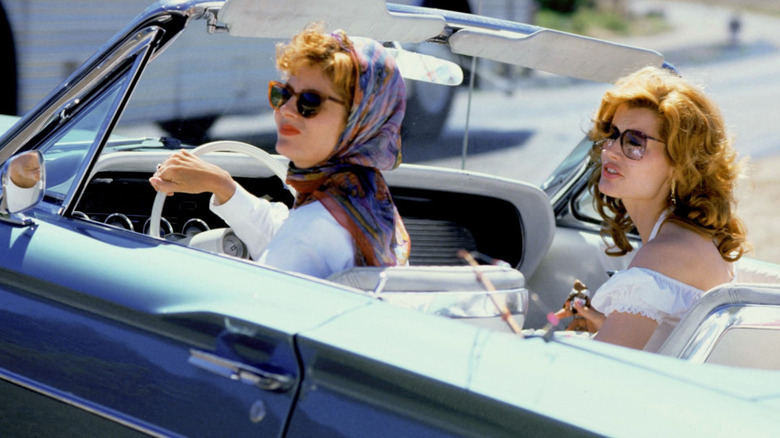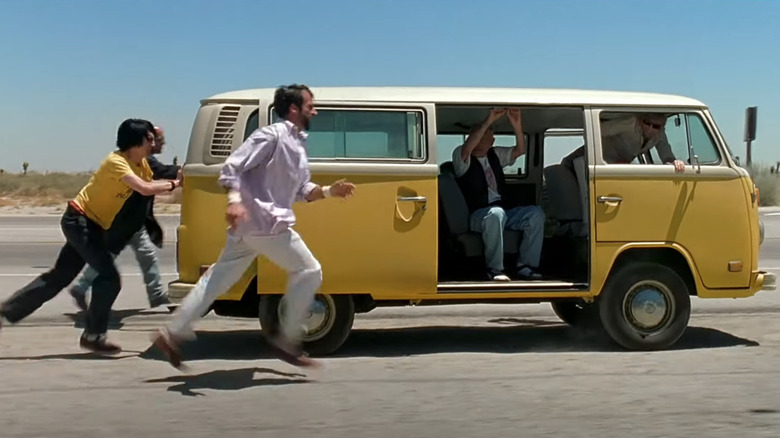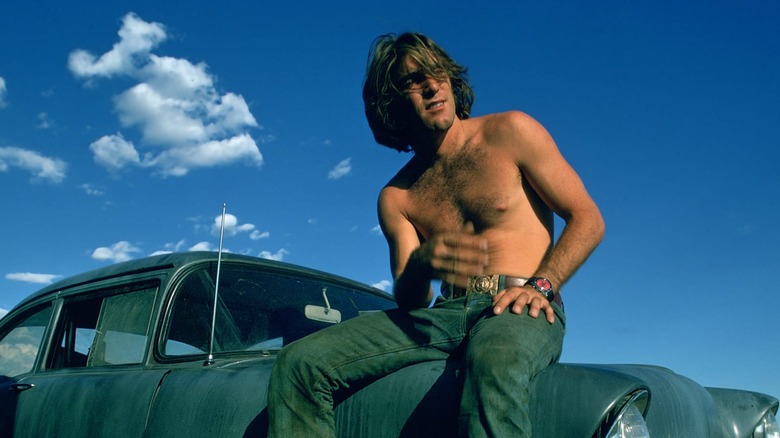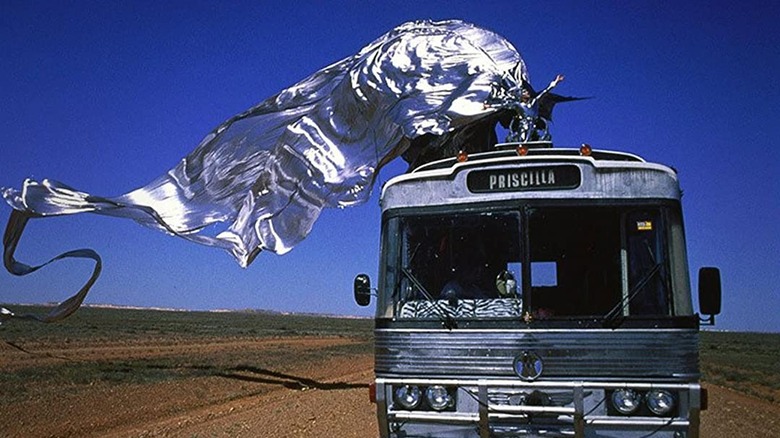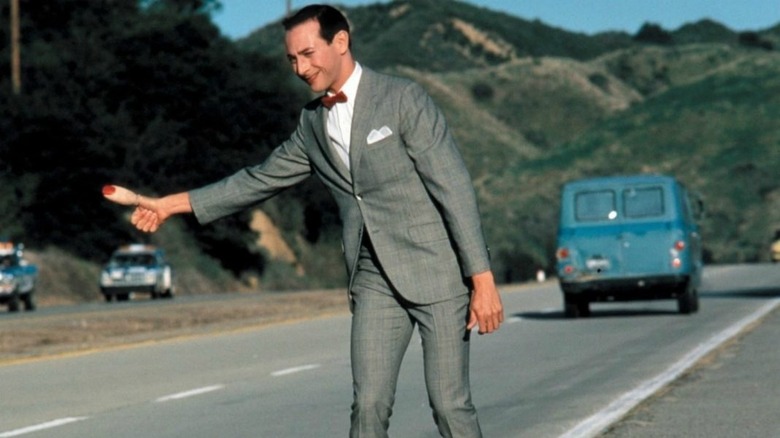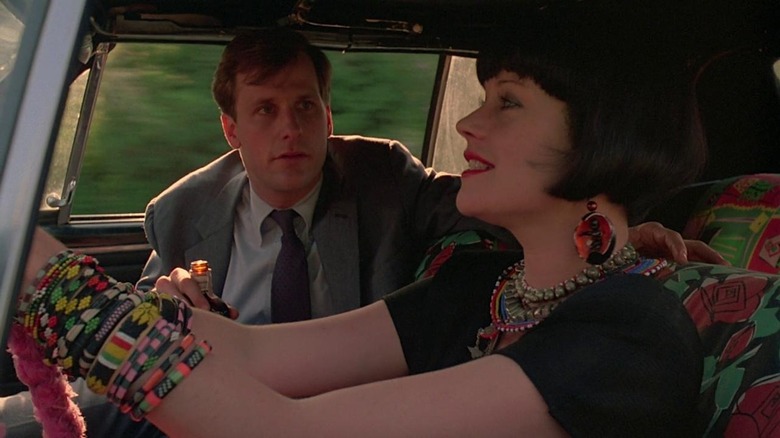27 Road Trip Movies Every Traveler Needs To Watch
The road is one of the most enduring images in film history because it can be used for so many different purposes. It can mean the freedom of adventure, or adventure's inevitable dead-end. Road trips can result in meeting interesting new characters, or they can be the worst kind of isolation or even the worst kind of forced bonding. Filmmakers from all over the world are continually drawn to the road movie and specifically the road trip movie, where a simple car or bus ride can become something much more meaningful. It offers plenty of opportunity for unexpected change, and it often does so in front of beautiful, overwhelming landscapes. They'll never stop making movies about road trips because people will never stop taking them, always wanting to see the sights and maybe become a little wiser in the process.
The 27 films in this list all take their own approaches to portraying the road trip cinematically, emphasizing its best and worst tendencies and playing them for both comedy and drama. But even the worst trips taken here offer something to appreciate, sometimes deep thought about the meaning of the road and sometimes a laugh at the expense of the poor fools stuck in the car.
1. Easy Rider
One of the most iconic road trips in cinematic history was taken by Peter Fonda and Dennis Hopper in Hopper's 1969 classic "Easy Rider." The legendary image of Fonda and Hopper riding their motorcycles while Steppenwolf's "Born To Be Wild" plays remains people's main association with "Easy Rider." But the movie itself is more complicated than just the thrill of riding down wide-open roads. The tagline tells of a man who went looking for America and "couldn't find it anywhere," and that's a good summation of the cynical eye this takes toward the country it explores.
Fonda and Hopper encounter some friendly people in their travels, most famously Jack Nicholson in his breakout role as a drunken lawyer. They encounter just as much resistance as they do support, from people with no tolerance for their countercultural attitudes and long hair. In one scene, Nicholson tells Hopper that people are scared of him because "what you represent to them is freedom," and the film's bleak ending offers little hope that freedom can be maintained in the face of such strong opposition. But the power of the film's images of freedom and joy is still enough to keep this as one of the beloved road movies.
2. Lost in America
Despite its cynicism, "Easy Rider" inspired many Americans to go out on the road themselves, even ones who couldn't be further away from Fonda and Hopper's biker lifestyle. This is the subject of writer, director, and actor Albert Brooks's 1985 film "Lost in America," in which a middle-class yuppie couple (Brooks and Julie Hagerty) hits the road and quickly realizes they can't handle it. By the end of the trip, they've destroyed their lives and their savings, and they've rid themselves of any romantic notions about traveling America without a plan.
Brooks' directorial work is defined by bitterness and discomfort as much as by laughs, and "Lost in America" can be particularly caustic. Brooks and Hagerty sink to some miserable depths during the course of their trip, reduced to begging for the money they just lost gambling or treating each other with naked hostility. A trip to the Hoover Dam doesn't offer scenery, instead serving as a backdrop to the couple's most vicious fight. "Lost in America" is a satire of the waste and excess of the American '80s, but it's also a reminder to make sure you've carefully thought through your road trip before you embark on one. Some people aren't ready for the road, and Brooks and Hagerty learn that too late.
3. The Color Wheel
Getting stuck with someone annoying on a long road trip can be a miserable experience, so spending the entirety of the 2011 comedy "The Color Wheel" with two annoying people on a road trip can make it a tough sell. But the film's writer-director, Alex Ross Perry, has an uncommon talent for writing people who only seem to be awful and irritating so that they're both funnier and more tragic than they would be in real life. That skill serves him especially well for the two leads of "The Color Wheel," an obnoxious brother and sister (played by Perry and Carlen Altman) whose road trip through New England leads them to meet strangers and old friends who are all even more awful than they are. The scenery offers little comfort when every scene becomes a passive-aggressive argument.
"The Color Wheel" is above all else a comedy, happy to laugh at its main characters for their abysmal social skills and undisguised contempt for each other and everyone around them. But as the trip goes on and they keep meeting hostile exes and classmates, their situation starts to seem a little sad, like they've been molded into hateful jerks by the whole world around them. Their final attempt to escape the cycle of anger and venom is shocking, but it's also unexpectedly tender, because Perry respects his characters even as they embarrass themselves.
4. Zola
Even the awful road trip of "The Color Wheel" can't compare to the nightmare trip taken by the title character of "Zola," and hers really happened. "Zola" was adapted from the famous Twitter thread detailing a disastrous trip to Florida taken by a part-time stripper (Taylour Paige) and a woman she just met (Riley Keough). There's not much time to enjoy Florida on this trip, the scenery consists of strip malls and different men's hotel rooms, and the business Zola has been dragged into quickly spirals into exploitation and violence.
"Zola" is about very bad events in a woman's life, but like the Twitter thread, it believes those events to be hilarious above anything else. The band of fools Zola winds up with can seem dangerous, particularly Colman Domingo's ambiguously accented pimp, but mostly they're all bluster and no brains. When they encounter people who are actually dangerous, they escape by the skin of their teeth. There's tension but never fear in "Zola," and that helps to make it a wonderful comedy even once the blood starts getting shed.
5. American Honey
"Zola" isn't the only movie where Riley Keough is a uniquely awful road trip presence. There's also the 2016 drama "American Honey", where Keough enlists a young girl played by Sasha Lane into a crew of door-to-door magazine salespeople. They travel blissfully across the Midwest, and Lane falls in love with a member of the crew, played by Shia LaBeouf. But their peaceful, off-the-grid existence is threatened by Keough and the precarity of their jobs.
A common thread across many of the great American road movies is that they're not directed by Americans, with international directors often looking at American landscapes in a different way than their American counterparts who've grown up with them. English director Andrea Arnold joins that group of directors with how she films America here, pushing the colors of the landscapes to such extremes that the emotions associated with them are also heightened, whether they be romance or danger. Her beautiful imagery is accentuated by her pulsing soundtrack, which switches between big-name pop hits and obscurities that perfectly match the mood of youthful excitement and negligence that defines "American Honey."
6. Stranger Than Paradise
While road trips can be fun and exciting, they can also be tedious, especially when there's not much scenery to look at. Writer-director Jim Jarmusch expertly captured the boredom of a bad road trip in his 1984 breakthrough "Stranger Than Paradise," in which the three leads take off in search of new experiences and don't find them anywhere they look.
Two of the leads are Hungarian émigrés hoping to find more from America than they did from their home. But the America portrayed in "Stranger Than Paradise" is just the most unremarkable areas of New York, Ohio, and Florida, presented so that the camera is just as unimpressed by them as the characters are. And only the most monotonous aspects of the road trip are shown, like driving through the endless expanse of Pennsylvania or arguing about who has to sleep on the cot when they get to a motel. Despite its tedium, "Stranger Than Paradise" is a very funny study of how the myths of the road can collapse in the face of the realities of going out on the road.
7. Badlands
Not all road trips start from good intentions. The one undertaken by Kit (Martin Sheen) and Holly (Sissy Spacek) in 1973's Bonnie and Clyde story "Badlands" starts after Kit murders Holly's father and burns down their house. That's where the journey begins, and eventually Kit is responsible for much more than one murder. But there's still an innocence to young Kit and Holly's trip, where they create their own society out in the wilderness and encounter all kinds of gorgeous nature. "Badlands," writes Sheila O'Malley for Criterion, is based on the 1958 murder spree of Charles Starkweather and Caril Ann Fugate, but its power doesn't come from its killings so much as its troubling naivete, where the blinkered teenage attitudes of its protagonists and the pastoral beauty of their surroundings say nothing about the horrible violence occurring right in front of them.
"Badlands" was the debut of writer-director Terrence Malick, who would go on to develop a reputation for his eye for natural landscapes. That's present even this early, shooting trees and sunsets so that they appear magical more than natural. But that magic here comes with a terrible price, and Malick seems as disturbed by nature's non-reaction to the evil committed all around it as he is entranced by its power.
8. My Blueberry Nights
Wong Kar-wai has directed some of the most beloved films of all time in his native Hong Kong, but to date, he's only made one movie in the United States. That was 2007's "My Blueberry Nights," which explores the unique geography of America through a road trip starting in New York and ending in Las Vegas. Wong is renowned for his intensely stylized movies, and "My Blueberry Nights" is no exception. Wong's America is beautiful in a way it isn't in real life — only Wong's oversaturated colors and beautiful golden light could make it look this gorgeous. In this way, Wong captures the feeling of a great road trip, of falling in love with every location you pass. And Wong ties all these stunning locales to his usual themes of heartbreak and melancholy, showing beautiful places inhabited by sad, lonely people.
"My Blueberry Nights" is held back from the levels of Wong's best movies by a weak script and inconsistent performances. Otherwise talented actors like Natalie Portman and Rachel Weisz go over the top, while even strong performances from Jude Law and David Strathairn have to go against the bland lead performance from singer and first-time actor Norah Jones. But such flaws don't matter too much in light of how enchanting Wong's vision of the world is. This is the kind of movie that makes people want to keep taking road trips.
9. Alice in the Cities
Few directors are as synonymous with the road and road movies as Wim Wenders, the German director who's made several of the best-loved movies about the road ever made. His most overt takes on the road genre are the three movies that make up his "Road Trilogy," starting with "Alice in the Cities" in 1974. "Alice in the Cities" concerns German writer Philip (Rüdiger Vogler), who follows a disappointing assignment by meeting a woman (Lisa Kreuzer) and her young daughter Alice (Yella Rottländer), then agreeing to go on a trip through Amsterdam. Their trip is marked by complications, boredom, and a lot of music, including a Chuck Berry concert and a jukebox playing Canned Heat. And all the while, Philip and Alice begin to develop a friendship.
"Alice in the Cities" is one of the most lasting Wenders movies, inspiring the work of filmmakers like Allison Anders and Mike Mills, particularly Mills' own adult-and-child road movie "C'mon C'mon." "Alice in the Cities" holds special power for its tale of unexpected companionship, where the road has the magic to bring together people who never would have even met under different circumstances. Even when the sights aren't exciting, getting to experience those sights with someone new can be a rewarding experience.
10. Magic Mike XXL
The success of the male-stripper comedy "Magic Mike" left star Channing Tatum and writer Reid Carolin with the duty of following up a movie that seemed to neatly wrap up at the end. Rather than repeat the first one's formula, Tatum and Carolin decided to go in another direction, turning 2015's "Magic Mike XXL" into an exuberant road trip movie about friends and the joy of performing. "Magic Mike" was an often melancholy movie about the recession, and while there are still economic worries all over "Magic Mike XXL," they mostly take a back seat to just enjoying the chance to escape from them for a few days.
The first film's director, Steven Soderbergh, didn't return to direct "Magic Mike XXL," but he did serve as its cinematographer, and he deserves special credit for how beautiful he makes the film's Southern locations look. Even an ordinary gas station comes to life with Soderbergh's golden light, to say nothing of the beaches and palatial estates Mike and his friends visit on their journey. The beauty of these locations also represents the simple beauty of hanging out with people you love, and this is where "Magic Mike XXL" separates itself from its predecessor. Mike's fellow strippers barely had personalities in the first one, but here they're best friends who love each other's company even as they razz each other. It's a unique pleasure to go on the road with such a tight-knit group.
11. Y tu mamá también
After making 2001's "Y tu mamá también," Alfonso Cuarón stuck to making large-scale spectacles and big-budget blockbusters. But in "Y tu mamá también," Cuarón applies his usual technical excellence to a simple story of a woman and two teenage boys going on a road trip. The Mexican landscapes they drive past are beautifully shot by future Oscar-winning cinematographer Emmanuel Lubezki, and their conversations are profane and hilarious, especially as delivered by Diego Luna and Gael García Bernal in their breakthrough roles. But a serious side creeps into "Y tu mamá también" as it goes on, eventually taking it over entirely.
As the three take their trip, they pass by political strife and Mexican culture soon to die out entirely. The characters may only be passing through these areas, but there are people living in the areas whose lives will be very difficult long after the leads are gone. Despite its main characters' immaturity, this is a surprisingly thoughtful road trip movie, understanding that even the most pristine locales are burdened by troubling history. That also turns out to be true about the main characters' dynamics, where the teenage leads eventually realize the depths of sadness and desperation they and their traveling partner carry with them. But before they get to that point, they have a great time, and so does the viewer watching them.
12. My Own Private Idaho
Gus Van Sant's "My Own Private Idaho" opens with River Phoenix's character, Mikey Waters, saying that he's traveled so much down so many roads that he can recognize the roads just by sight. His life on the road is a beautiful but lonely one until he finds someone he can briefly share it with, a senator's son, Scott Favor (Keanu Reeves). Their journeys across deserted roads and rocky landscapes are sometimes silly but mostly poetic and sad, showing two young men as lost in the scenery as they are in their own lives.
Van Sant makes a lot of odd digressions in "My Own Private Idaho," including a sequence with talking erotic magazines and an entire plot loosely adapted from Shakespeare's "Henry IV" saga, writes Amy Taubin for Criterion. But the heart of the film is the relationship between Mikey and Scott, one where Mikey may be the only one of the two to realize how special and intimate it is. A heartbreaking scene at a campfire sees Mikey get tantalizingly close to professing his love to Scott and not quite doing so. While Mikey may have lived his life by the isolation of the road, he needs Scott to share that life with him, and the film offers little hope that this will happen.
13. The Straight Story
The films and TV of David Lynch are usually filled with the darkness and violence that lurk beneath the beautiful landscapes of America. But Lynch still loves those landscapes and the people who inhabit them, and never is that clearer than his only movie to get a G rating, 1999's "The Straight Story." He tells the story of a real-life road trip, where an elderly, almost blind farmer named Alvin Straight (Richard Farnsworth) drove a lawn mower from Iowa to Wisconsin to see his ailing brother (Harry Dean Stanton).
There's not much dialogue in "The Straight Story," especially for the long stretches where Alvin is on his own out on the road, but it's not necessary when Lynch is working with the wide-open expanses of the midwest. He finds magic in the crop dusters and near-empty roads Alvin encounters, setting the sights to a moving Angelo Badalamenti score and making them even more powerful. And when Alvin does meet other people, their encounters are simple and touching, showing the hard lessons Alvin has learned about family over the course of a long, difficult life.
14. Dog
Channing Tatum and Reid Carolin made their directorial debuts in February 2022 with "Dog," which followed the "Magic Mike XXL" model of a road trip encountering lesser-known sections of American life. "Dog" is a sadder movie than "Magic Mike XXL" because the trip's ultimate destination is a military funeral, and along the way, Tatum and his dog co-star must contend with the trauma they've suffered as soldiers. This makes the bond of friendship between Tatum and the dog even more important than it is in "Magic Mike XXL," as it provides both of them life-saving help when they need it the most.
The most impressive aspect of Tatum and Carolin's first directing job is how well they film the landscapes encountered over the course of the trip. They make them symbols of the beauty of everyday life without making them overly stylized. The duo learned well from Steven Soderbergh's visual excellence without merely copying it. While "Dog" has its faults, including some awkward comedy at the beginning and a too-brief attempt to deal with the racism instilled into Iraq War soldiers, the strength of Tatum and Carolin's filmmaking and storytelling suggests that they could have a good future as directors.
15. Kings of the Road
The third film in Wim Wenders' Road Trilogy, "Kings of the Road" is a three-hour opus combining two of Wenders' favorite subjects: the road and cinema. The two titular "kings" are a movie theater projector repairman (played by "Alice in the Cities" lead Rüdiger Vogler) and a depressed psychologist (Hanns Zischler), who band together on a road trip after the psychologist has experienced a life-shattering breakup. They drive across what was then the East German border, touring worn-down movie theaters so that Vogler can make repairs.
"Kings of the Road" offers even less of a plot than "Alice in the Cities" does, also offering one of the purest, simplest depictions of a road trip on film. There's no inevitable endpoint for the characters to reach, just a sprawling journey where they come to slightly better understand each other and themselves. It encompasses all the joy and melancholy of road trips in one package, people searching for more from life hoping that they'll find it behind the wheel.
16. Having a Wild Weekend
1965's "Having a Wild Weekend," also known as "Catch Us If You Can," is technically a vehicle for The Dave Clark Five, the British group that came into popularity at the same time as The Beatles. "Having a Wild Weekend" would seem to put the band in a comedy just like "A Hard Day's Night," but director John Boorman instead made a lovely, melancholy road movie, showing two people trying in vain to escape their confining lives back home.
Dave Clark plays a stuntman who takes off on a road trip with a model (Barbara Ferris) dissatisfied with her position as the face of ad campaigns for meat. On their journey, they encounter the youth who will soon become the counterculture and the old men still obsessed with the imagery of old Hollywood. Everywhere they go, Clark and Ferris are reminded of the culture they're trying to fight against, but they're powerless to stop it. The two have impressive chemistry together, but their relationship is a sad one, one that can only last the length of the road trip even though they're the only people who could possibly understand each other. Even once the remaining four Dave Clark Five members show up to do some slapstick, the tone is more elegiac than silly.
17. Wild at Heart
For a more representative David Lynch road trip movie, there's "Wild at Heart," which manages to be funny and romantic as well as frightening. Sailor and Lula, the giddy young couple played by Nicolas Cage and Laura Dern, hit the road only after Lula's mother has unsuccessfully tried to kill Sailor, and on their journey they'll deal with more killers and more victims. But their love may be strong enough to keep them safe every step of the way.
The giddy energy of "Wild at Heart" is unusual for Lynch movies, which usually have a more deadpan tone. Cage and Dern are balls of energy in this, engaging in grand romantic gestures and, in Cage's case, frequently falling into Elvis impersonations. The world around them has gone mad with rage and violence, the road bringing as many terrors as beauties, and they seem to have adapted to that madness by matching it. The title doesn't lie — these are two wild kids who will let nothing, not even a horrifying figure like Willem Dafoe's psychopathic Bobby Peru, stand in the way of their love. And for all the darkness of the rest of the movie, Lynch is still kind-hearted enough to give them a happy ending.
18. Two For the Road
All the good and bad feelings associated with going on the road are present in 1967's "Two for the Road," and they also represent the ups and downs of a marriage. The good and the bad are shuffled together in a nonlinear style, where pieces of the beginning, middle, and end of Audrey Hepburn and Albert Finney's characters' relationship are presented as a series of out-of-order road trips. There is some beautiful European scenery over the course of the trips, but the fractured editing means that the destinations of the trips are less important than the trips themselves, and how they function as both bonding exercises and sources of arguments.
The film's most hilarious section is when Hepburn and Finney commit the error of going on a road trip with another couple, an obnoxious American family that makes the two sure of the mistakes they don't want to make in their own relationship. But of course they end up making those mistakes, and by the end "Two for the Road" is a bittersweet movie about how difficult and tricky it is to stay close to someone, whether that means marrying them or staying with them on a long car ride.
19. Don't Come Knocking
Wim Wenders and playwright-actor Sam Shepard first collaborated on the 1984 road movie "Paris, Texas," one of the most acclaimed films in the genre. Their decades-later second collaboration was 2005's "Don't Come Knocking," another road movie that couldn't match the critical success of its predecessor. But "Don't Come Knocking" is a very good movie in its own right, finding a lot of power both in western vistas and the tragic figure passing in front of them.
Shepard wrote and stars in "Don't Come Knocking," playing a washed-up Western star who ditches the set of his new movie in favor of driving to Nevada and then Montana, where both cheap thrills and old family await him. As with Wenders' other films, he makes the western settings of "Don't Come Knocking" look incredibly beautiful, shooting casinos, small-town squares, and vast deserts with the same level of vibrant color and light. And it also shares with Wenders' other work a tremendous sadness, where Shepard has abandoned the people who need him most and has only realized this too late to do much of anything about it. This trip may not be able to redeem Shepard, but it can get him one step closer, and that's better than he's done yet.
20. Highway 61
Canadian director Bruce McDonald followed in Wim Wenders' footsteps and made his own trilogy of road movies through the 1980s and '90s. The middle film in the trilogy was 1991's "Highway 61," a joyous comedy about American rock 'n' roll. Highway 61 is the highway named in Bob Dylan's legendary "Highway 61 Revisited" album, and one of the two leads (Valerie Buhagiar) is a rock-obsessed drug dealer trying to smuggle a dead body from Canada to New Orleans. Her partner (Don McKellar) is a nervous, shy barber who prefers jazz. Their odd-couple dynamic is very charming, and it only gets more charming as the trip brings them closer together.
"Highway 61" is led not just by romance and scenic views of all of North America, but by a great soundtrack at every step of the journey, often from obscure local bands McDonald is kind enough to introduce to his audience. And there's also plenty of oddball humor, particularly with a character who may or may not be the devil (Earl Pastko) chasing the two leads. "Highway 61" doesn't have much of a reputation outside of its native Canada, but it's a blissful film that deserves more attention.
21. Get On the Bus
One of the least commonly filmed ways of going on a road trip is taking the bus, perhaps because getting stuck with many unfamiliar people is not the most romantic way to see the country. But Spike Lee found a lot of drama, comedy, and political relevance in a story of a bunch of guys trapped on the bus. That story is 1996's "Get On the Bus," following a group of Black men en route to the famed Million Man March. Lee believes that every one of those million men has their own story, and he fits as many of those stories as he can into one bus.
As usual with Lee, "Get On the Bus" has an impressive cast, including Ossie Davis, Charles S. Dutton, Andre Braugher, and Bernie Mac. The characters touch on social issues, including homophobia and the anti-Semitism of Million Man March leader Louis Farrakhan, but mostly they have frank and funny conversations that naturally reveal their prejudices and moral stances rather than shout them out. Lee didn't write "Get On the Bus" (that was Reggie Rock Bythewood), but it shares the perceptive dialogue and unexpected comedy of Lee's best screenplays, including his beloved "Do the Right Thing." "Get On the Bus" is a smaller movie than "Do the Right Thing," but its confined setting doesn't mean it's any less riveting.
22. Thelma & Louise
The road trip that runs through 1991's "Thelma & Louise" is most famous for where it ends, with Thelma and Louise's car in the middle of a jump off a cliff. But their journey shouldn't just be defined by its endpoint, as the entirety of "Thelma & Louise" is a rollicking ode to female friendship and the healing power of the road trip, showing it as a rare opportunity for two women to take their lives into their own hands.
A few things remain consistent throughout Thelma (Geena Davis) and Louise's (Susan Sarandon)'s road trip, namely the beauty of the southwest locations as shot by director Ridley Scott and the appalling behavior of the men both women meet along the way. "Thelma & Louise" is today best-known as the breakthrough film for breakout film for Brad Pitt, but he's only one of the film's parade of awful, often violent men, including the rapist who begins the journey in the first place. With such overpowering adversity, it's no wonder Thelma and Louise are so tight-knit — they must make their bond as strong as the forces united against them. And their bond can sustain even the steepest fall from a cliff.
23. Little Miss Sunshine
"Little Miss Sunshine" was the sensation of the 2006 Sundance Film Festival (per IndieWire), its story of a dysfunctional family trapped in a Volkswagen van on the way to a child beauty pageant in California proving irresistible to both critics and audiences. The famous images of the film, like the family chasing after the bright yellow Volkswagen, suggest the kind of quirky, Wes Anderson-inspired comedy that was all the rage in the 2000s. But like actual Wes Anderson movies, "Little Miss Sunshine" deals with real pain and hurt, trapping several very fragile people in a small space where they might all combust.
It's helped by having such a sturdy cast playing those fragile people, including Steve Carell in one of his first dramatic performances, a silent Paul Dano, an Oscar-winning Alan Arkin, and most of all an Oscar-nominated Abigail Breslin as the girl all this trouble is in service of. The movie might have collapsed into road-movie cliches without a strong presence anchoring it, and Breslin, then 10 years old, proves more than capable of being that presence.
24. Two-Lane Blacktop
The most existential of all road movies might be 1971's "Two-Lane Blacktop," where driving is the only way of life for its main characters. But they aren't driving with any destination in mind; they're driving because it's the one thing they know how to do. Car culture was a big part of the '60s and '70s, and "Two-Lane Blacktop" has a supporting part for Dennis Wilson, whose work with the Beach Boys helped to cement cars as the ultimate symbol of cool and independence. But it's not all fun for the characters of "Two-Lane Blacktop," with the emptiness of the road ahead of them also representing the emptiness of their own obsessions and personalities.
Shot on the famed Route 66, with minimal dialogue to distract from the scenery, "Two-Lane Blacktop" is not short on great shots of cars in motion. But "Two-Lane Blacktop" also decries the hollowness of making cars the centerpiece of one's life, showing that a lifestyle based solely on speed and appearance cannot be sustained. The film's most famous line is "Those satisfactions are permanent," but the pleasures prove to be a very impermanent, fleeting bliss that doesn't disguise much deeper troubles.
25. The Adventures of Priscilla, Queen of the Desert
In addition to being one of the great road trip movies, "The Adventures of Priscilla, Queen of the Desert" was also a breakout LGBTQ film when it was released in 1994, offering such a sunny view of its group of drag queens that it would be pointless to resist. The next year, America was already attempting its own "Priscilla" with the fellow drag-queen road movie "To Wong Foo, Thanks For Everything! Julie Newmar," but it couldn't compete with the original, particularly regarding the gorgeous vistas passed by the central trio. The stunning deserts of the Australian Outback prove to be an ideal setting for a story with outrageous outfits and colors, offering a plain brown backdrop on top of which every outfit and character pops out.
Not that the characters need any help standing out, especially when they're brought to life with such exuberance and talent. Only Terence Stamp, playing the transgender matriarch of the group, was an internationally known actor at the time of the release of "Priscilla." But the film also catapulted its other two leads, Hugo Weaving and Guy Pearce, to their stardom. Even as all three actors are now almost three decades out from "Priscilla," it remains one of their crowning achievements, as well as one of the most infectiously cheerful road movies yet made.
26. Pee-Wee's Big Adventure
One of the goofiest, most enjoyable road trips ever taken on film was the one taken by Pee-Wee Herman (Paul Reubens) as he searched for his lost bike in Tim Burton's feature directorial debut "Pee-Wee's Big Adventure." Pee-Wee would later become famous for his television show, where he created his own wacky universe, but in "Pee-Wee's Big Adventure," he travels through the real America and finds that it's just as silly as he is. Whether visiting dive bars, Hollywood backlots, or even The Alamo, he bends every place he visits to his own indescribable wavelength.
Burton has made flashier, more expensive movies since "Pee-Wee's Big Adventure," but he's rarely made anything better. His work becomes so defined by production design and special effects after this that it's a shock to see him working mostly with real locations, making the natural world ridiculous rather than creating ridiculous worlds from scratch. And the road movie proves an ideal match for his love of middle-American eccentricity, where every new character Pee-Wee meets on his travels is an oddball in their own way. This remains Burton's funniest and sweetest movie, free of the bitter edge that distinguishes many Burton movies and instead celebrating the goofiness of life.
27. Something Wild
Jonathan Demme's "Something Wild" takes a sharp turn around its midpoint, turning from a joyous road comedy to something scarier and more intense. But all of "Something Wild" is united by Demme's love of the road and of the people you can meet along the way. Sometimes those people can change your life, like how Melanie Griffith's free-spirited Lulu gets Jeff Daniels' yuppie businessman Charlie to admit that he has a wilder side than he presents to the world. And other times they can threaten that life, like Ray Liotta as Lulu's malevolent ex-husband, Ray, who resolves to force Charlie out of Lulu's life and win her back.
Even as "Something Wild" gets dark, Demme still finds something magical in every location visited, and often in places that seem perfectly ordinary. A friendly convenience-store employee, a dog on the back of a motorcycle, and a waitress singing outside of a New York greasy spoon — these details all come to vibrant life in front of Demme's camera. Few people have taken a road trip involving this many wacky, endearing characters, but the world as Demme portrays is a better, brighter place than it is in real life. It's a joy to experience a road trip in this world, even if only for two hours.
